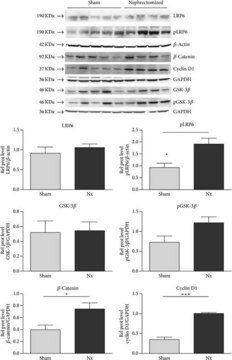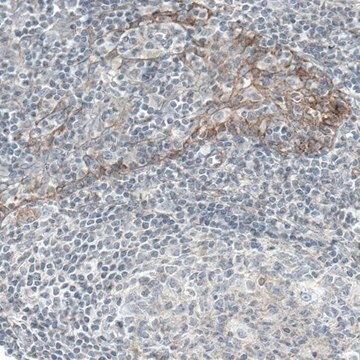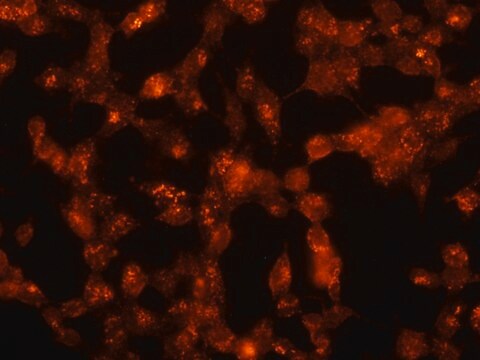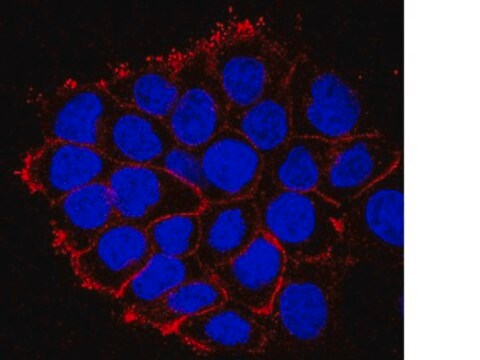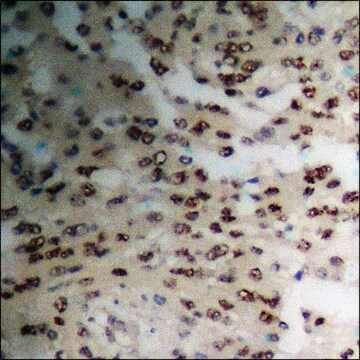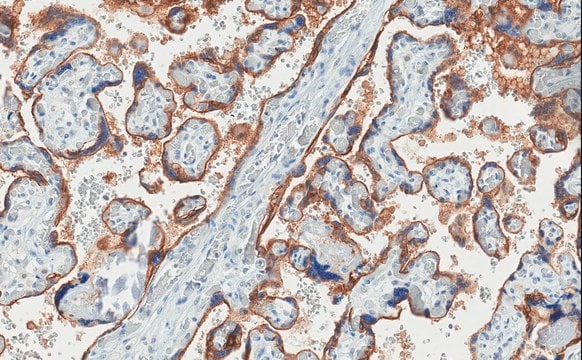推荐产品
生物源
mouse
品質等級
抗體表格
purified antibody
抗體產品種類
primary antibodies
無性繁殖
13G8, monoclonal
物種活性
mouse, human
製造商/商標名
Chemicon®
Upstate®
技術
ELISA: suitable
immunocytochemistry: suitable
western blot: suitable
同型
IgG1
UniProt登錄號
運輸包裝
wet ice
目標翻譯後修改
unmodified
基因資訊
human ... EGFR(1956)
mouse ... Egfr(13649)
特異性
Recognizes C-terminus domain of EGF receptor (aa1165-1186)
免疫原
KLH-conjugated synthetic peptide encompassing the surrounding amino acids of the C terminus in human EGFR
應用
Anti-EGFR (C-terminus) Antibody, clone 13G8 detects level of EGFR (C-terminus) & has been published & validated for use in ELISA, IC & WB.
Research Category
Signaling
Signaling
Research Sub Category
Growth Factors & Receptors
Growth Factors & Receptors
品質
Routinely evaluated by immunoblot.
標靶描述
180 kDa
聯結
Replaces: 04-337; 04-338
外觀
Subsequent thiophilic adsorption and size exclusion chromatography
100 µg of purified mouse monoclonal IgG lyophilized in PBS containing 0.09% sodium azide, PEG, and sucrose
Format: Purified
儲存和穩定性
2 years at -20°C from date of shipment
分析報告
Control
Includes EGF treated Hep2G lysate as a positive control
Includes EGF treated Hep2G lysate as a positive control
法律資訊
CHEMICON is a registered trademark of Merck KGaA, Darmstadt, Germany
UPSTATE is a registered trademark of Merck KGaA, Darmstadt, Germany
免責聲明
Unless otherwise stated in our catalog or other company documentation accompanying the product(s), our products are intended for research use only and are not to be used for any other purpose, which includes but is not limited to, unauthorized commercial uses, in vitro diagnostic uses, ex vivo or in vivo therapeutic uses or any type of consumption or application to humans or animals.
未找到合适的产品?
试试我们的产品选型工具.
儲存類別代碼
10 - Combustible liquids
Xiaozhu Zhang et al.
Journal of medical genetics, 44(3), 166-172 (2006-12-13)
Frequent overexpression of epidermal growth factor receptor (EGFR) in non-small-cell lung cancer (NSCLC) makes EGFR a new therapeutic target. Two specific EGFR tyrosine kinase inhibitors, gefitinib (ZD1839, Iressa) and erlotinib (OSI-774, Tarceva), have been developed and approved by the US
Katsuyuki Hotta et al.
Oncology reports, 17(2), 313-317 (2007-01-05)
Despite its tremendous antitumor effect in a subset of patients with non-small cell lung cancer (NSCLC), the exact mechanism of gefitinib-induced cell death has not been fully determined. In this study, forms of cell death in various NSCLC cell lines
Francesca Walker et al.
Experimental cell research, 313(3), 511-526 (2006-12-13)
The site of action of growth factors on mammalian cell cycle has been assigned to the boundary between the G1 and S phases. We show here that Epidermal Growth Factor (EGF) is also required for mitosis. BaF/3 cells expressing the
Alexandra I Rosa et al.
The Journal of neuroscience : the official journal of the Society for Neuroscience, 30(13), 4573-4584 (2010-04-02)
In the adult mammalian brain, the subventricular zone (SVZ) hosts stem cells constantly generating new neurons. Angiopoietin-1 (Ang-1) is an endothelial growth factor with a critical role in division, survival, and adhesion of endothelial cells via Tie-2 receptor activity. Expression
Jane Fraser et al.
EMBO reports, 20(10), e47734-e47734 (2019-08-27)
Despite recently uncovered connections between autophagy and the endocytic pathway, the role of autophagy in regulating endosomal function remains incompletely understood. Here, we find that the ablation of autophagy-essential players disrupts EGF-induced endocytic trafficking of EGFR. Cells lacking ATG7 or
我们的科学家团队拥有各种研究领域经验,包括生命科学、材料科学、化学合成、色谱、分析及许多其他领域.
联系技术服务部门